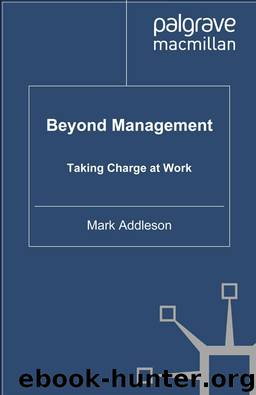Beyond Management by Mark Addleson

Author:Mark Addleson
Language: eng
Format: epub
Publisher: Palgrave Macmillan
CHAPTER 12
Conversations for aligning: openness, commitments, and accountability
Aligning
Organizing is often hard work. Aligning, which I’ve called the “bottom-line of organizing,” takes experience, ingenuity, and, sometimes, tough bargaining. Assignments that seem perfectly straightforward turn out to hide wicked problems that reveal themselves only when you are trying to clarify something or when you are looking for agreement from the team about what still needs to be done. Reaching agreement may take all kinds of compromises and could depend on knowing: which rules and procedures to follow, which you can bend, and how to circumvent others entirely; when to sidestep long-winded procedures even though you’ve been told “this is the way we do things here”; what you can do to free up funds, yet stay within budget.
When a diverse group of stakeholders is trying to align, however, semitechnical matters like these are not usually the toughest nuts to crack. Some of the really taxing ones include: reaching consensus about the problems you are dealing with and how to tackle them; settling on whose position to support; obtaining permission or approval; ensuring that associates in diverse locations, with different affiliations and interests, follow through with the commitment to their work and one another required to do a good job. Even when their activities and roles intersect and they need to collaborate, the chances are that participants aren’t all on the same page. Perhaps, it is those varied interests. One or two just don’t seem particularly involved. It is hard to get their attention and, when you do, they have their own ideas about what needs to be done. There are more headaches when something goes wrong in the middle of an assignment or project and you have to reorganize to put things right. Who is responsible? What do we do about them and the breakdown, and prevent this from happening again? When they hit one of these problems, in order to move forward, the participants have to work at realigning.
Aligning has to do with attitudes, motives, values, and interpersonal relationships. It is adaptive, not technical, work. Besides a willingness to compromise, or, if the going gets particularly tough, to accept some form of mediation or arbitration, working through issues like these takes commitment, patience, and determination, which are just some of the qualities activists may need to take on the work of organizing. The practical route to aligning is always for participants to engage and talk things through, to find out what the others think, to look for common ground, to test each other’s suppositions and resolve, and to see where colleagues dig in their heels and where they are accommodating. Wouldn’t it be nice if, whenever we found ourselves floundering, we could turn to a repertoire of conversations to help us move ahead—conversations that would help us negotiate through the thicket of tough problems, get unstuck, and align?
Perhaps the idea of a repertoire of conversations sounds to you suspiciously like turning talk—the discussions in which people align for action—into a set of tools.
Download
This site does not store any files on its server. We only index and link to content provided by other sites. Please contact the content providers to delete copyright contents if any and email us, we'll remove relevant links or contents immediately.
The Brazilian Economy since the Great Financial Crisis of 20072008 by Philip Arestis Carolina Troncoso Baltar & Daniela Magalhães Prates(106311)
International Integration of the Brazilian Economy by Elias C. Grivoyannis(76012)
The Art of Coaching by Elena Aguilar(52218)
Flexible Working by Dale Gemma;(23213)
How to Stop Living Paycheck to Paycheck by Avery Breyer(19573)
The Acquirer's Multiple: How the Billionaire Contrarians of Deep Value Beat the Market by Tobias Carlisle(12118)
Thinking, Fast and Slow by Kahneman Daniel(11816)
The Radium Girls by Kate Moore(11642)
The Art of Thinking Clearly by Rolf Dobelli(9942)
Hit Refresh by Satya Nadella(8871)
The Compound Effect by Darren Hardy(8531)
Atomic Habits: Tiny Changes, Remarkable Results by James Clear(8058)
Tools of Titans by Timothy Ferriss(7833)
Turbulence by E. J. Noyes(7720)
Change Your Questions, Change Your Life by Marilee Adams(7394)
A Court of Wings and Ruin by Sarah J. Maas(7290)
Nudge - Improving Decisions about Health, Wealth, and Happiness by Thaler Sunstein(7264)
How to Be a Bawse: A Guide to Conquering Life by Lilly Singh(7167)
Win Bigly by Scott Adams(6839)
